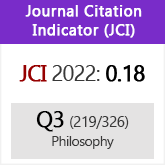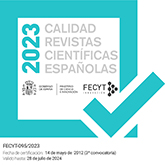Pascal’s ungraspable self compared to the strength of the cartesian subject
DOI:
https://doi.org/10.3989/isegoria.2010.i42.695Keywords:
Pascal, Descartes, subject, self, orders of reality, reason, heartAbstract
Compared to Descartes, who attempted to make the thinking subject the centre and strengthen its power, Pascal was confronted with the contingency, chance and opacity of human existence. He tried to «decentralise» the subject and delve further into its deepest dissonance. He classified three unmeasurable orders of reality: body, spirit and charity. On a moral level, for Pascal the «ordo amoris» represents the absolute viewpoint to which all relative points of view are ordered. Only through a release from the desire of domination can the human being discover true justice and goodness.
Downloads
Download data is not yet available.
Downloads
Published
2010-06-30
How to Cite
Villar Ezcurra, A. (2010). Pascal’s ungraspable self compared to the strength of the cartesian subject. Isegoría, (42), 265–278. https://doi.org/10.3989/isegoria.2010.i42.695
Issue
Section
Notes and Discussions
License
Copyright (c) 2010 Consejo Superior de Investigaciones Científicas (CSIC)

This work is licensed under a Creative Commons Attribution 4.0 International License.
© CSIC. Manuscripts published in both the printed and online versions of this Journal are the property of Consejo Superior de Investigaciones Científicas, and quoting this source is a requirement for any partial or full reproduction.All contents of this electronic edition, except where otherwise noted, are distributed under a “Creative Commons Attribution 4.0 International” (CC BY 4.0) License. You may read here the basic information and the legal text of the license. The indication of the CC BY 4.0 License must be expressly stated in this way when necessary.
Self-archiving in repositories, personal webpages or similar, of any version other than the published by the Editor, is not allowed.














